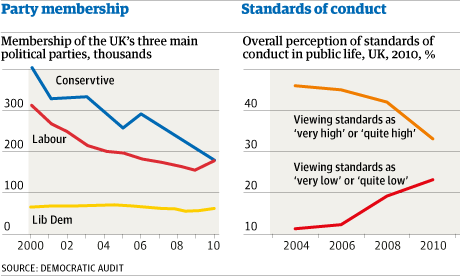Copied from Votes for Expat Brits blog - 8th July 2012 |
British Overseas Still Denied Vote and Yet British Democracy in Terminal Decline!by right2vote4xpatbrits |
British
citizens resident overseas wanting to
vote are still denied such rights
after 15 years abroad and yet British democracy is in terminal
decline, as Corporate power,
unrepresentative politicians and apathetic voters
leave the UK 'increasingly unstable', says
study.
Surely
this is when additional barriers to
participation in the political process such as
the 15 year rule should be
removed and British citizens
encouraged to vote including those resident
overseas?
If
you agree we would appreciate you adding your vote
in support of Votes for Expat Brits in our
Sign-up poll here.
"the
depth of public disillusionment and the range of
ways voters are turning away from politics
revealed by the latest study could shock even
those involved"

"The
reality is that representative democracy, at the
core, has to be about people voting, has
to be about people engaging in political parties,
has to be about people having contact with elected
representatives, and having faith and trust in
elected representatives, as well as those
representatives demonstrating they can exercise
political power effectively and make decisions
that tend to be approved of," said Wilks-Heeg.
"All
of that is pretty catastrophically in decline.
How low would turnout have to be before we
question whether it's really representative
democracy at all?" The UK's democratic
institutions were strong enough to keep operating
with low public input, but the longer people
avoided voting and remained disillusioned, the
worse the problem would get", said Wilks-Heeg.
"Over
time, disengagement skews the political process
yet further towards those who are already more
advantaged by virtue of their wealth, education or
professional connections. And without mass
political participation, the sense of
disconnection between citizens and their
representatives will inevitably
grow."
Membership
of political parties and election turnout has
fallen significantly in the last decade, with only
1% of the electorate belonging to a party, and
just over six out of 10 eligible voters going to
the ballot box in the 2010 general election and
barely one in three in European and local
elections. But the depth of public
disillusionment and the range of ways voters are
turning away from politics revealed by the latest
study could shock even those
involved.
Sadiq
Khan, shadow justice secretary and former chair of
human rights group, Liberty, said: "What I find
really troubling is there's no shortage of
big issues which we must get to grips
with – the economy, the future of our
health, education and social care systems, our
environment – many of which grab the attention of
the public, but there's a disconnect when
it comes to party politics."
